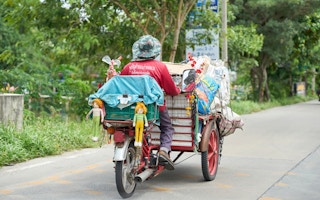Recent negotiations for an international legally binding instrument on plastic pollution ended with a notable commitment to have the first treaty draft ready by the end of November.
To continue reading, subscribe to Eco‑Business.
There's something for everyone. We offer a range of subscription plans.
- Access our stories and receive our Insights Weekly newsletter with the free EB Member plan.
- Unlock unlimited access to our content and archive with EB Circle.
- Publish your content with EB Premium.
Other than a growing urgency to tackle the environmental effects of plastic pollution, the need to address the social implications brought about by the plastic crisis is gaining traction, with recognition that informal waste workers or waste pickers need to be engaged and involved in the conversation. Last year, the Group of Friends of Waste Pickers, a voluntary body of representatives from United Nations member states was launched to provide a platform for waste pickers to voice their concerns in ongoing negotiations of the treaty.
However, even as it is a significant and unprecedented move that recognises the importance of these workers in the recycling value chain, such representation still does not adequately reflect the sector’s huge contribution to the fight against plastic pollution. Moreover, at the second negotiation meeting of the treaty, among thousands of attendees, one could find only a handful of delegates who represented the informal waste sector.
While there is strong ambition to map out a treaty that will bring about fairer prices, as well as improved health and safety standards for the waste pickers, the final text that binds policy on such sensitive topics remains to be seen.
Fragmented waste management has deep roots in Southeast Asia
In developing markets across Southeast Asia, the lack of formal waste management infrastructure and processes has resulted in a highly fragmented ecosystem. Various participants along the value chain – in both formal and informal employment – are needed to cope with the large amounts of mismanaged plastic waste.
Vietnam, one of the region’s fastest growing economies, is a case in point, with workers in the informal economy processing more than 90 per cent of recyclable waste, according to estimates. In urban locations such as Da Nang, Vietnam’s coastal city, recycling is often not part of the formal waste sector’s services. Research into selected wastesheds or geographical regions that have a common solid waste disposal system across the nation found that the majority of plastic waste recycled in the city – currently rigid polymers such as PET (polyethylene terephthalate) and HDPE (high-density polyethylene) – is being recycled by craft villages made up of households participating in various stages of the value chain, as the city does not have any known permitted recyclers.
Waste pickers are often viewed as operating marginally, and without clear links to the formal value chain. In reality, some may come together to form larger scale cooperatives – including those operating under private- and public-sector contracts - while others choose to work independently.
Due to the diversity of the workforce, any solution to uplift waste pickers must recognise their specific challenges and needs – and this can only happen when they are empowered to put their views forward.
Give workers in informal employment a voice
In the case of Vietnam, the informal economy is primarily made up of individuals who take up the job due to the flexibility it provides, such as middle-aged women who have to balance other family commitments.
Strategies developed to integrate these workers into the waste management system should prioritise providing flexibility and social benefits without mandating fixed hours. In contrast, for others seeking formal employment, companies can engage them as contractual labour or full-time employees, both of which guarantee structured hours, income and social protection.
Such distinct characteristics need to be recognised when considering ways to embed inclusivity in the plastic waste value chain. A key step would be to establish local stakeholder consortiums with representatives across the full value chain, including waste pickers. This creates a safe environment where the voices of informal waste workers can be heard – the first step to ensuring that responsible sourcing practices can become a reality in emerging markets.
Local partners, waste picker and other worker associations that possess an in-depth understanding of the plastic waste management ecosystem, as well as have strong ties with the informal recycling sector, should be involved too. With this approach, concrete and viable solutions to improve human rights and responsible sourcing practices across the entire recycled plastic supply chain can then be developed.
Regulatory tailwinds create window of opportunity
The global plastics treaty negotiations has also brought about momentum for change, with more supportive regulations for waste workers now being put in place. We are seeing the first seeds of growth of a coordinated approach to a complex and multifaceted problem.
For example, the introduction of Extended Producer Responsibility (EPR) schemes across Southeast Asia – including in Vietnam where the central government introduced an EPR law in 2022 – has the potential to transform how plastic waste is collected and recycled. This puts greater pressure on all value chain actors – from global brands to local recyclers and aggregators – to ensure that waste is managed in both environmentally and socially responsible ways.
Also in Vietnam, just last month, a National Action Plan for Enhancing Responsible Business Practices marked a significant milestone, signalling the government’s commitment to promote good practices across the country.
If the world is able to pick up momentum to embark on more collaborative efforts and amplify the voices of waste pickers, it will be on the path to create a more resilient plastics value chain that is transparent and socially inclusive.
Annerieke Douma is director of programmes at The Circulate Initiative. The non-profit advocates against ocean plastic pollution.









